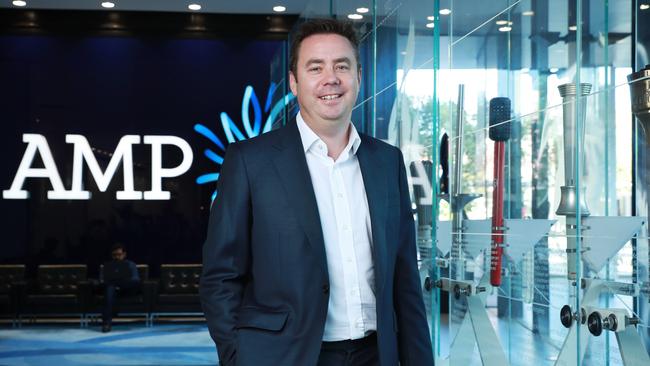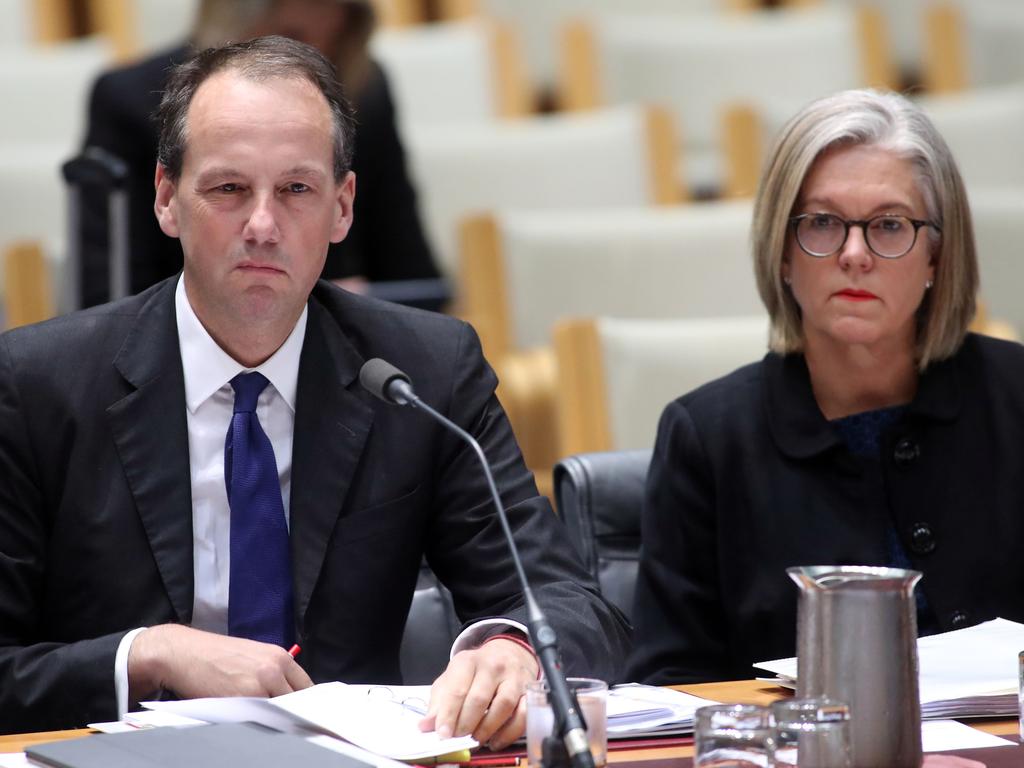AMP investors pressure David Murray-led board to expedite change, fix cultural shortcomings
Investors are demanding cultural change at AMP, after the wealth group saw off senior executive Alex Wade for inappropriate conduct.

Investors are ramping up pressure on the David Murray-led AMP board to rectify cultural issues and expedite change, following the sudden exit of senior executive Alex Wade over inappropriate conduct.
Pressure on AMP’s board and management is intensifying after The Australian revealed the departure of Mr Wade last week was linked to sending lewd photos and poor conduct and performance.
Mr Murray didn’t return calls seeking comment over the matter on Monday and an AMP spokesman declined to comment, referring to the company’s statement last week.
That statement said AMP chief executive Francesco De Ferrari had accepted Mr Wade’s resignation which was “effective immediately”, and no explanation was given.
Mr Wade led AMP’s Australia division which included its wealth and advice operations and its bank division.
His exit came just weeks after AMP’s promotion of Boe Pahari to lead the AMP Capital division sparked controversy, given he had been financially penalised over a harassment incident several years earlier.
On Monday, Mr De Ferrari sent an internal memorandum to staff still digesting the departure, reminding them the company takes complaints seriously.
The memo was distributed to AMP’s more than 5000 staff, but didn’t address reasons for the sudden exit. Australian Council of Superannuation Investors chief Louise Davidson said AMP’s board had to address cultural issues “as a matter of urgency”.
“This latest development, coming after the appointment of Pahari and the subsequent departure of a number of senior executives, does seem to confirm that there are significant cultural issues at play.”
“From an investor perspective, this raises questions about how the company will be able to attract or retain high-quality staff. These cultural issues may well have a detrimental impact on the company’s relationship with clients which could, in turn, have a significant impact on the business,” she added.
“Investors will be expecting the board to articulate a clear plan on how they are going to manage and rectify these ongoing cultural issues. If that is not forthcoming in coming weeks, investors would need to consider what accountability measures are most appropriate in the circumstances.”
ACSI members — mostly industry funds — own on average 10 per cent of every top 200 ASX company.
An institutional shareholder in AMP, fund manager Allan Gray, on Monday called on the company to expedite cultural change.
“Whilst there may be good reasons for AMP’s lack of transparency (on Mr Wade’s departure), it’s incredibly frustrating from a shareholder’s perspective,” Allan Gray managing director Simon Mawhinney said. “It’s important that AMP ensure their cultural change is on the right footing and is expedited.”
Another large investor in AMP, who declined to be named, said they had raised concerns with the company on its cultural shortfalls and were closely monitoring the situation.
AMP’s shares fell 1.4 per cent to $1.395 on Monday, bucking a 1.8 per cent rise in the S&P/ASX200.
A spokesman for Mr Wade on Friday said he had decided to resign “in the interests of all parties”.
Mr Wade said he would focus on a period of reflection and relationships that were important to him.
Mr De Ferrari has sought to tackle concerns about AMP’s culture by setting up a taskforce, which he will chair, to drive inclusion and diversity across the group. He has also outlined the appointment of an external expert to help steer inclusive leadership.
AMP’s seven-member executive team includes just one woman, group executive for people and corporate affairs Helen Livesey.
Investors will hear more about Mr De Ferrari’s turnaround plan and cultural change when he hands down AMP’s first-half earnings on Thursday. They also want to hear of any capital management plans following the sale of its life insurance arm.
On fixing AMP’s culture, Australian Shareholders’ Association monitor Ian Graves urged the board and management to do more, and provide clear time frames for change.
“In my personal view they still haven’t come to grips with culture,” he said.
“It should come from the top down … They should be more forthcoming with what they are doing to change.”
Mr Graves said he believed AMP acted correctly regarding Mr Wade’s conduct and departure, but labelled the promotion of Mr Pahari “a mistake” that sent the wrong message.
Shareholder pressure
At AMP’s annual general meeting in May, the ASA represented retail investors with almost 3.7 million shares.
Shareholder pressure on AMP’s board has been building in 2020. The company copped a strike against its pay report in May when 67 per cent of investors voted against remuneration. One proxy adviser said AMP’s executive rewards were “disproportionately large”, while others questioned performance hurdles.
Australian Foundation Investment Company’s Geoff Driver said the listed group had sold its residual holding in AMP earlier this year. “At the end of the day we saw opportunities elsewhere,” he added.
“It is a very difficult industry at the moment.
“They (AMP) are going through significant change.”
The financial advice industry is enduring sweeping change following the Hayne royal commission and tougher educational standards being introduced.
Mr De Ferrari has outlined an overhaul of AMP’s wealth unit, which was meant to be spearheaded by Mr Wade.
Blair Vernon, AMP’s New Zealand wealth management boss, has been appointed acting AMP Australia chief while a search is conducted.
Mr De Ferrari has warned of a halving of AMP’s underlying group profit to between $140m and $150m for the six months to June 30.








To join the conversation, please log in. Don't have an account? Register
Join the conversation, you are commenting as Logout